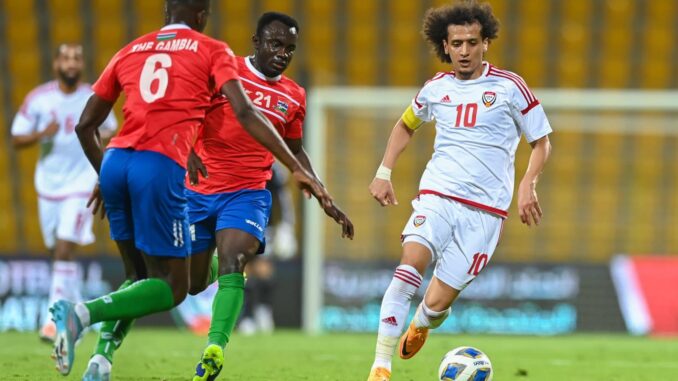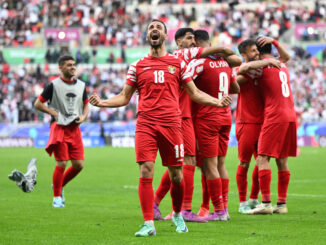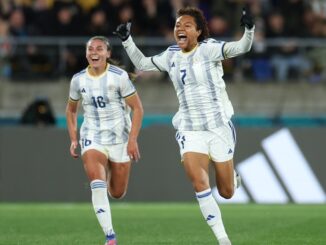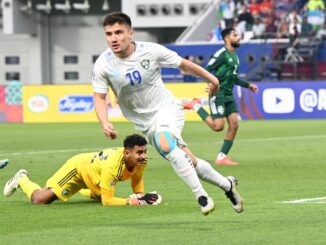
On a typically balmy summer’s evening at Sydney’s cavernous Olympic Stadium for the quarter final of the 2015 AFC Asian Cup, a collective gasp could be heard echoing around the barely quarter-filled stadium.
It was not a gasp of shock – although there was plenty of that – but more ‘I can’t believe he did that!’
After Keisuke Honda, the posterboy of Asian football, had inextricably put his opening penalty over the bar, up stepped his supposed heir apparent, Omar Abdulrahman.
The Emirati wunderkid, although he was no longer a kid at 23, had set the tournament alight with a series of performances that had lived up to his pre-tournament hype. This was a man ready to fulfill his limitless potential. This was his moment, and boy did he own it.
As he stood over the ball from 12 yards, all the pressure on his shoulders, he embarrassed experienced Japanese goalkeeper Eiji Kawashima with an audacious Panenka that left onlookers speechless.
After Honda had skied his penalty, it truly felt like a moment that the batton of Asia’s biggest star had been handed from the bleached blonde Japanese to the afro-haired Emirati.
Fast forward seven years, however, and far from being the entry point to the story of the trailblazing career of the man they call ‘Amoory’, that moment and that tournament is sadly remembered as the peak.
While he was crowned as Asia’s best player 18 months later at a glitzy awards ceremony at Abu Dhabi’s opulent Emirates Palace, his reputation was never more heightened than it was during that history making month in the Australian summer of 2015.
As the Emirates ‘Golden Generation’ faltered on the path to Russia 2018, when they were instead meant to challenge the elite of Asian national team football, Abdulrahman’s star began to fade, especially as transfer window after transfer window came and went without the long-rumoured move to Europe.
A string of serious knee injuries that kept him sidelined for much of the past few years kept the one-time golden boy out of the spotlight.
To borrow a popular catchphrase, he was very much out of sight and out of mind.
His injury concerns coincided with a period of constant upheaval and disruption at club level, as headline grabbing moves to Al Hilal and Al Jazira failed to produce anything noteworthy before eventually the ‘Pride of Abu Dhabi’ cut him loose, deeming him not part of their immediate plans, in a sign of how far his star had fallen.
His star was no longer just fading, it was completely extinguished.
But fate and those fabled sporting scriptwriters work in mysterious ways, and as the UAE lurched and stumbled towards an unlikely World Cup berth, Abdulrahman found whatever spark was still flickering in his star to give hope where once there was none.
In one display during the AFC Champions League group stages, as his Shabab Al Ahli side, managed by Mahdi Ali, the man who was so influential during the formative years of Abdulrahman’s career, swatted aside Qatar’s Ah Gharafa 8-2, Amoory showed he still has it.
The touch. The guile. The audacity. The range of passing. It was all there.
So close to the Emirates sudden-death playoff against Australia, it was hard not to get lost in the romance of it all. Could the one-time golden boy, who hadn’t even played for the national team in over two years, return to the fold to lead his nation to an unlikely World Cup berth?
It would, in one instant, wipe away any disappointment his biggest fans had at a perceived ‘waste’ of his talent. It would, surely, secure his legacy as a legend of Emirati football and a great of Asian football.
But John McAuley, journalist for Emirati English-language newspaper The National, cautions against expecting too much from the now 30-year-old.
“The headline news to come out as the last few weeks was obviously that Omar’s back that’s given everyone a huge boost,” he told The Asian Game podcast from Doha.
“If you’re talking about his impact on the pitch, and what he can bring to these two qualifiers, I’m not really too sure. I think obviously he’s still finding his feet after a long, long time out with injuries.
“Don’t forget he returned in November, then got another injury, and then was out until just before the group stages of the Asian Champions League. So this is someone who hasn’t played a lot of football.
“And you know, this isn’t the Omar Abdulrahman that that you saw in Australian 2015. This is a 30 year old Omar Abdulrahman, one with a serious serious injury since then. So I’d say you’d have to be very wary of what kind of effect he can have.”
McAuley did concede, however, that just having him back in the fold, after an absence of over two years is enough to lift the spirits around the camp, and he does provide Rodolfo Arruabarrena with a serious weapon to deploy off the bench if the game remains deadlocked into the second half.
“But don’t get me wrong, having him around the national team around the squad and having him as that option to come off the bench if you need to maybe find a killer pass or unlock the Australian defence, Omar’s certainly someone who can do it.
“The UAE have been crying out for a playmaker all the way through through this qualification. As soon as they lost Fabio de Lima, (they lost) a lot of their creativity or spark that someone could do something out of nothing. That pretty much left whenever Fabio was injured, he was there for the first four matches, I think, of the final round and then then sustained a pretty severe injury.
“So having Omar back is fantastic news. And it’s it has lifted the squad and definitely lifted expectations, but I think we have to be very careful of what to expect from him.”
Despite the injuries, despite his age and despite his lack of match fitness, one question lingers – does he have one final act, one final piece of magic left in him?
Photo: UAE FA
Listen to Episode 85 of The Asian Game podcast as we preview the Asian Qualifiers playoff between the UAE and Australia




